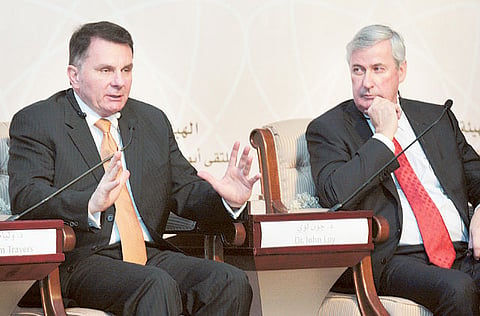UAE nuclear plants designed to withstand earthquakes
Facilities completely safe as they incorporate latest technologies and safeguards

Abu Dhabi: The UAE’s nuclear facilities are designed to withstand the frequency and gravity of Korea’s quakes — of a much graver and of a much larger magnitude than those occurring here in the Gulf region, nuclear energy experts have assured.
“The earthquake resistance of the UAE’s nuclear plants is 0.3g [a measure of peak ground acceleration],” said Dr William Travers, Director General of the Federal Authority for Nuclear Regulation (FANR), at the sidelines of a public forum held at the Emirates Centre for Strategic Studies and Research on Monday.
He said that by adopting those protective features of Korea, the UAE has got additional margin built into its design here… to operate without any problem from any earthquake that might occur in the region.
He said the UAE’s nuclear power plants would be completely safe since they had incorporated the latest technologies and the safeguards recommended by the International Atomic Energy Agency (IAEA).
To a question from the audience on the tsunami-induced disaster at Japan’s Fukushima nuclear plant in 2011 and what design changes incorporated into the UAE’s facilities to protect any such challenges, Dr Travers said that the technology that was being utilised in Japan was that of the 60s and 70s, but the UAE was using much advanced technology to ensure the maximum safety level at the planned nuclear power plants in the country.
A severe earthquake and resulting tsunami that wrecked Fukushima’s power plant in March 2011 raised serious safety concerns for the world.
The UAE plans to have four nuclear power reactors operational in Barakah by 2020, to generate 5.6 GW of electricity. The first plant has been under construction since July 2012, with a South Korean consortium awarded a multi-billion-dollar contract. The plant, named Barakah 1, will be ready by 2017, while the second of Barakah 2 is scheduled to be operational by 2018.
Dr Travers said that FANR was reviewing a proposal to build two more units at Barakah site, but no decision as yet has been made.
To a question on the management of nuclear waste, he said the UAE has been looking for a number of available options but has not yet finalised a strategy. “When the government will select a strategy, we will evaluate it in accordance with the IAEA guidelines,” he added.
Dr Travers said the FANR is a regulatory authority that advises on safety and safeguard standards and issues licences for nuclear activities including the handling of radioactive material and radiation sources used in medicine, research, oil exploration, and other industries.
He said that a disaster management plan was in place. “The likelihood of a nuclear disaster is very small but even then you need to have a plan, A contingency plan has been developed in coordination with various UAE organisations, he said.
Dr Travers said the UAE made certain decisions that set concerns to rest at the very beginning of its ambitious nuclear programme. Most notably, it assured the world that its programme is intended for peaceful purposes, mainly to generate electricity. The UAE also pledged not to enrich uranium within its borders or reprocess the nuclear waste. These are the two activities which, if a country chooses to pursue them, pushes a civil nuclear programme into the military realm, he said. “With all these assurances and commitment to nuclear non-proliferation, the UAE’s programme is of gold standard,” said the FANR chief.
The forum, one of a series being held across the country, was hosted by the FANR at the Emirates Centre for Strategic Studies and Research and aimed to introduce the FANR’s role in ensuring the safety, security and peaceful nature of the nuclear programme in the UAE.



